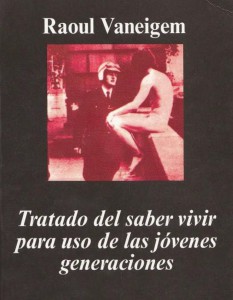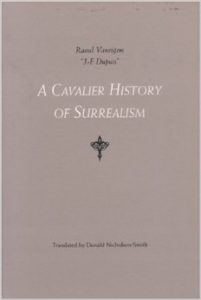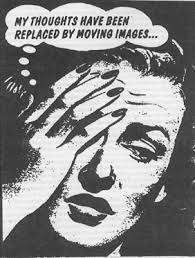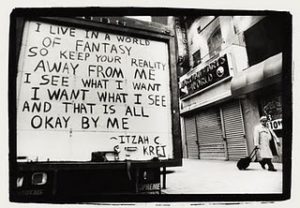Tratado del saber vivir para uso de las jóvenes generaciones
Tag Archives: Vaneigem Raoul
Contributi alla lotta rivoluzionaria destinati a essere discussi, corretti e principalmente messi in pratica senza perdere tempo
Ratgeb (Raoul Vaneigem)
Nota introduttiva alla seconda edizione
Ci sono tanti modi di leggere questo libretto, ogni lettore se ne deve inventare uno, uno che gli aggrada e che gli apra le porte di un “mondo nuovo”. In effetti è questo lo scopo del suo autore. Non una guida pedissequa e noiosa, ma un continuo ribollire di proposte, alcune perfino paradossali – almeno ad una prima lettura – ma che ben presto si rivelano del tutto logiche, bene inserite in un contesto che, come si potrà constatare, non perde un colpo.
Si può dire che questo testo parla da solo, che non ha bisogno di assistenza introduttiva, ed è questo uno dei motivi che mi spinsero a non proporre nessuna nota per la prima edizione italiana, uscita nell’ormai lontano 1978, sempre con le Edizioni Anarchismo.
In fondo lo stesso voglio fare adesso. Solo poche righe.
Distruzione del lavoro, distruzione della merce, sabotaggio e saccheggio, scioperi selvaggi e occupazione delle realtà produttive, dono e distruzione della merce. E poi, senza riprendere fiato, domande: che farsene dell’organizzazione? Della merce? Della produzione autogestita?
Basic Program of the Bureau of Unitary Urbanism
Raoul Vaneigem, Attila Kotányi (1961)
1. NOTHINGNESS OF URBANISM AND NOTHINGNESS OF THE SPECTACLE
Urbanism [1] doesn’t exist; it is only an “ideology” in Marx’s sense of the word. Architecture does really exist, like Coca-Cola: though coated with ideology, it is a real production, falsely satisfying a falsified need. Urbanism is comparable to the advertising about Coca-Cola — pure spectacular ideology. Modern capitalism, which organizes the reduction of all social life to a spectacle, is incapable of presenting any spectacle other than that of our own alienation. Its urbanistic dream is its masterpiece.
2. CITY PLANNING AS CONDITIONING AND FALSE PARTICIPATION
Continue reading Basic Program of the Bureau of Unitary Urbanism
Il godimento implica la fine della funzione intellettuale e dello stato. L’intellettualizzazione è l’ultimo stadio dell’espansione mercantile.
1 – I progressi dell’intellettualità esprimono il progresso dell’organizzazione come bisogno prioritario dell’economia.
Continue reading Il godimento implica la fine della funzione intellettuale e dello stato. L’intellettualizzazione è l’ultimo stadio dell’espansione mercantile.
A Cavalier History of Surrealism
Raoul Vaneigem
Author’s Note
Commissioned in 1970 by a French publisher who planned to issue a series intended for high-school pupils, this Histoire désinvolte du surréalisme was written in a couple of weeks under the pressure of a contractual deadline. The fact that the original bearer of the name chosen as a pseudonym, “Jules-François Dupuis”, was the janitor of the building where Lautréamont died, and a witness to his death certificate, should be a clear enough sign that this book is not one of those that are particularly dear to my heart; it was merely a diversion.
Basic Banalities (1963)
Raoul Vaneigem
Part I
1
Bureaucratic capitalism has found its legitimation in Marx. I am not referring here to orthodox Marxism’s dubious merit of having reinforced the neocapitalist structures whose present reorganization is an implicit homage to Soviet totalitarianism; I am emphasizing the extent to which Marx’s most profound analyses of alienation have been vulgarized in the most commonplace facts, which, stripped of their magical veil and materialized in each gesture, have become the sole substance, day after day, of the lives of an increasing number of people. In a word, bureaucratic capitalism contains the palpable reality of alienation; it has brought it home to everybody far more successfully than Marx could ever have hoped to do, it has banalized it as the diminishing of material poverty has been accompanied by a spreading mediocrity of existence.
Continue reading Basic Banalities (1963)
Basic Banalities
Raoul Vaneigem
Part I
1
Bureaucratic capitalism has found its legitimation in Marx. I am not referring here to orthodox Marxism’s dubious merit of having reinforced the neocapitalist structures whose present reorganization is an implicit homage to Soviet totalitarianism; I am emphasizing the extent to which Marx’s most profound analyses of alienation have been vulgarized in the most commonplace facts, which, stripped of their magical veil and materialized in each gesture, have become the sole substance, day after day, of the lives of an increasing number of people. In a word, bureaucratic capitalism contains the palpable reality of alienation; it has brought it home to everybody far more successfully than Marx could ever have hoped to do, it has banalized it as the diminishing of material poverty has been accompanied by a spreading mediocrity of existence. As poverty has been reduced in terms of mere material survival, it has become more profound in terms of our way of life — this is at least one widespread feeling that exonerates Marx from all the interpretations a degenerate Bolshevism has derived from him. The “theory” of peaceful coexistence has accelerated such an awareness and revealed, to those who were still confused, that exploiters can get along quite well with each other despite their spectacular divergences.
A Communique from a Partisan of Individual and Collective Autonomy
Raoul Vaneigem
Considering that the habitants of Oaxaca have the right to live their lives as they wish, in the city and the region that belong to them.
Continue reading A Communique from a Partisan of Individual and Collective Autonomy
Abolire le prigioni
di Raoul Vaneigem
Il regno odioso delle prigioni non finirà senza che ciascuno impari a non imprigionarsi più in un comportamento economizzato dai riflessi del profitto e dello scambio.
Continue reading Abolire le prigioni









